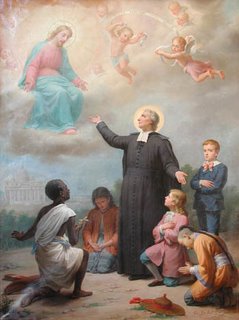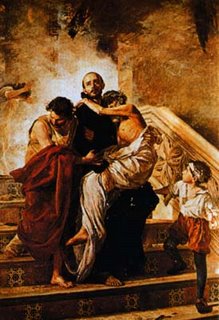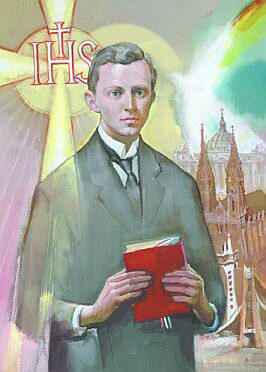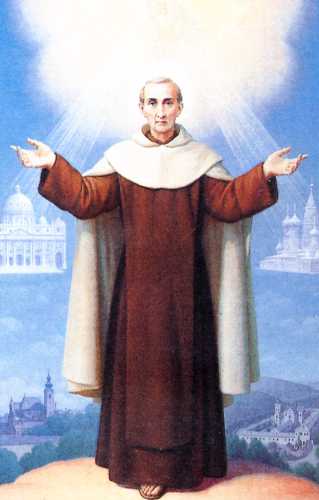
In an age where many countries are feeling the shortage of Priests the Church needs more men like Hannibal Di Francia.
Hannibal Di Francia, was born in the year 1851 in Messina Sicily. He was fortunate to be born into a wealthy and socially prominent family, but this did not lead Hannibal to have a haughty or arrogant view on life. Unfortunately for Hannibal his father died when he was very young his mother Anna Di Francia, a noble woman by birth sent Hannibal at only age 7 to boarding school, this would help open Hannibal's eyes to the world beyond his own home environment.
Being of a kind disposition he was shocked at the actions of his fellow boarders and their harsh attitude towards the poor in their area. One day a beggar was able to gain access to the school cafeteria where he then begged for some sustenance, many of the children were cruel and made fun of this poor man, little Hannibal though was horrified to see such poverty. He was even more horrified to witness many of his friends tease and torment this poor beggar, finally Hannibal could stand it no longer and he went forward to give the poor man some food.
Hannibal from a very early age showed a great love for the Eucharist and with his inherent humility and meekness of character he was allowed to receive Communion much earlier than other children. This love for Jesus in the Eucharist would hold sway over his entire life and also the need to promote Priestly vocations, truly he was a boy ahead of his times. When Hannibal was 15 his boarding school had to close down and so Hannibal undertook private instructions at home where he thrived on learning everything he could.
Things would change for Hannibal one day as he prayed in front of the Blessed Sacrament and felt God calling him to the Priesthood. During this time in prayer these words took root in this young man's heart and mind, "Ask the Lord of the harvest to sent out laborers to gather his harvest." These words would prompt Hannibal in his mission to promote the Priestly vocation to all he could. Through this insight Hannibal was able to tap into what would become a crucial need in the generations that would follow, he surely is a prophet for these times.
Once Hannibal had completed his studies in theology he was Ordained into the Priesthood in the year 1878. Though Hannibal did not have to struggle financially still he never forgot that poor beggar who had come to his boarding school and upon meeting a blind beggar Francesco Zancone, he was able to see for himself the sad plight of many of his fellow citizens, this sight affected Fr. Hannibal profoundly. Being fatherless himself gave Hannibal a compassionate empathy towards other children who were also orphaned at young ages.
The plight of the poor and the homeless so deeply touched Fr. Hannibal that he decided to make his home alongside the disenfranchised of society after gaining the Bishops approval for this move, he set out to do all he could to try and alleviate many of the sufferings he saw within the poor community.
At first the poor in his region were suspicious of this Priest who though his intentions were good many felt that he would lack the stamina to be successful and so some paid scant regard to this Priest and what they assumed was his naivety when dealing with the truly impoverished. This did not put Fr. Hannibal off one bit and he set out not to prove these people wrong but to simply be a shepherd to his flock and bring them the Good News.
As he walked the streets he could not fail to see the miserable conditions that many children were left to wallow in and one child in particular touched his heart. The poor boy was mentally retarded and was being misused and abused by some around him, Fr. Hannibal could not stand to see such suffering and so brought the young boy home with him. After feeding him a wholesome meal and giving the poor boy a bath, Fr. Hannibal made him a comfortable bed and after prayers he gently said goodnight to the poor boy. When gazing at his face, suddenly the boy's features turned into the face of Jesus, Fr. Hannibal was deeply moved, and even more determined to help these children in a more meaningful and practical way.
This would set the course for the foreseeable future as Fr. Hannibal began to instruct the children of his area, firstly by starting day schools and then with orphanages for both girls and boys. This total devotion to the poor also brought with it controversy as many of his former social standing didn't understand his love for the poor and so questioned why this Priest was so dedicated to what they considered the 'dregs of society', this questioning didn't stop Fr. Hannibal who also had the support of the Bishop and some fellow Priests. It was during this time that Fr. Hannibal wrote this poem:
So bread upon the table might not lack,
I brave the cold, the dripping sweat on back…
Oh, here it is today the food my children need;
Tomorrow's dole our Father sure will speed.
I've often knocked on doors, a scant welcome bidden
My sentence stiff has scarce been hidden:
"Beware of him, the pest, he's lost his mind.
Now let him suffer fate unkind!"
Discern my martyrdom, my flaming core;
No father loved his children more…
For you I God and man implore!
As the good works of Fr. Hannibal progressed he did not forget his first love that of promoting the Priesthood and this through prayer, for Fr. Hannibal understood the power of prayer most especially for Religious vocations. With this in mind Fr. Hannibal began a new Religious Order called 'The Daughters of Divine Zeal' at a later date he also founded the 'Rogationists' both of which were approved in the year 1926. With this mission for Priests in mind Fr. Hannibal started several projects one of them being a periodical called 'God and Neighbour' so that all could enjoin him in praying for vocations and promoting the Priesthood.
While doing all this work Fr. Hannibal was also one of the Priests that Luisa Piccarreta had chosen for her spiritual director, this would bring more controversy as many misunderstood the meaning of Luisa's particular calling. The Catholic Church is still investigating the message given to this noble soul, Luisa Piccarreta.
As Fr. Hannibal undertook all this work with holy zeal many of his contemporaries were already calling him the 'saintly Priest', Fr. Hannibal simply got on with the work God had called him to do with humility and a deep sense of charity towards all even those who were antagonistic towards his various fields of work.
Throughout his entire life Hannibal Di Francia always kept his eyes on his goal that of doing God's Will rather than his own. He also never lost sight of his particular mission that of spreading the love of the Priesthood to all who would listen. This world so needs more Priests of Fr. Hannibal's calibre.
Father Hannibal Di Francia died in 1927.
Saint Hannibal Di Francia was canonized in the year 2004 by Pope John Paul II.
Some Quotes:
"What are these few orphans we attend to, these few people we bring the good news to, compared to the millions who are lost and abandoned as sheep without a shepherd? I looked for an answer and I found a complete one in the words of Jesus: 'Ask the Lord of the harvest to send out laborers to gather his harvest'. I concluded then that I had found the secret key to all good works and to the salvation of all souls".
"From my early youth I have committed myself to that Holy Word of the Gospel: ‘Rogate ergo...' From my small Institutes an unceasing daily prayer is raised by the orphans, the poor, the priests and the consecrated virgins, to the most Sacred Hearts of Jesus and Mary, to Saint Joseph and the Apostles, that they may abundantly provide the Church with holy and chosen priests and with evangelical workers for the spiritual harvest of souls."
"The entire Church must formally pray for [vocations] because the purpose of the prayer to gain vocations must concern all the faithful, every Christian who has at heart the good of souls and, in a particular way, the Bishops who are the shepherds of the spiritual flock and to whom souls are entrusted. They are the living Apostles of Jesus Christ today."
Peace of Christ to ALL
Copyright © 2006 Marie Smith. All rights reserved.



